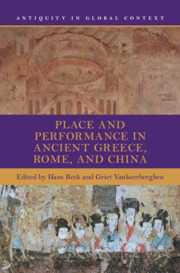Book contents
- Place and Performance in Ancient Greece, Rome, and China
- Antiquity in Global Context
- Place and Performance in Ancient Greece, Rome, and China
- Copyright page
- Contents
- Figures
- Tables
- Contributors
- Series Editors’ Preface
- Editors’ Preface
- Introduction
- Part I Crafting Space and Place
- Part II Performances of Power
- Part III Urban Places
- Chapter 7 Neighborhood Life in Imperial Rome and Han Chang’an
- Chapter 8 Society, Cities, and the Significance of ‘Sacred Roads’ in Archaic Greece, in the Chinese Qin and Han Empires, and in the Archaic States of the Middle East
- Chapter 9 Hydropolitical Engineering in Rome and Chang’an
- Chapter 10 Imperial Gardens in Early Roman and Chinese Empires
- Part IV Fringe Places and Endpoints
- Index
- References
Chapter 10 - Imperial Gardens in Early Roman and Chinese Empires
A Comparative Study
from Part III - Urban Places
Published online by Cambridge University Press: 28 November 2024
- Place and Performance in Ancient Greece, Rome, and China
- Antiquity in Global Context
- Place and Performance in Ancient Greece, Rome, and China
- Copyright page
- Contents
- Figures
- Tables
- Contributors
- Series Editors’ Preface
- Editors’ Preface
- Introduction
- Part I Crafting Space and Place
- Part II Performances of Power
- Part III Urban Places
- Chapter 7 Neighborhood Life in Imperial Rome and Han Chang’an
- Chapter 8 Society, Cities, and the Significance of ‘Sacred Roads’ in Archaic Greece, in the Chinese Qin and Han Empires, and in the Archaic States of the Middle East
- Chapter 9 Hydropolitical Engineering in Rome and Chang’an
- Chapter 10 Imperial Gardens in Early Roman and Chinese Empires
- Part IV Fringe Places and Endpoints
- Index
- References
Summary
Imperial gardens in ancient Rome and China were as much a physical arrangement of place as they were discursive realms, evoking imagination and invective alike. Starting from semantic observations on ancient Latin and Chinese terminologies, Wentian Fu explores the divergent contexts and concepts of imperial gardens in each culture. The first section traces the respective origins: while inextricably intertwined with ideas of visibility, citizenship, and republican traditions in Rome, the chapter argues for a conspicuous absence of those vectors in China prior to Western Han traditions. The analysis of odes from the Book of Songs reveals, on the contrary, close connections with the power-invested charge of palatial structures. In the second section, the author showcases how Roman aristocratic gardens evolved over time from aristocratic domains into imperial properties, dynamically growing in size and scope. The gardens in Nero’s Golden House, which are given exemplary consideration, both resembled and reversed the order of human spheres and nature. In doing so, they paralleled Shanglin Park and the Jianzhang Palace outside of Chang’an: the chapter explains how those sites were critical to the emperor’s pursuit of immortality. In the concluding section, Fu fully capitalizes on his findings, immersing the argument in the ambiguities of imperial gardens both as seductive spaces of transgression, indulgence, and debauchery, and as role model instantiations of good governance.
- Type
- Chapter
- Information
- Place and Performance in Ancient Greece, Rome, and China , pp. 318 - 346Publisher: Cambridge University PressPrint publication year: 2024

